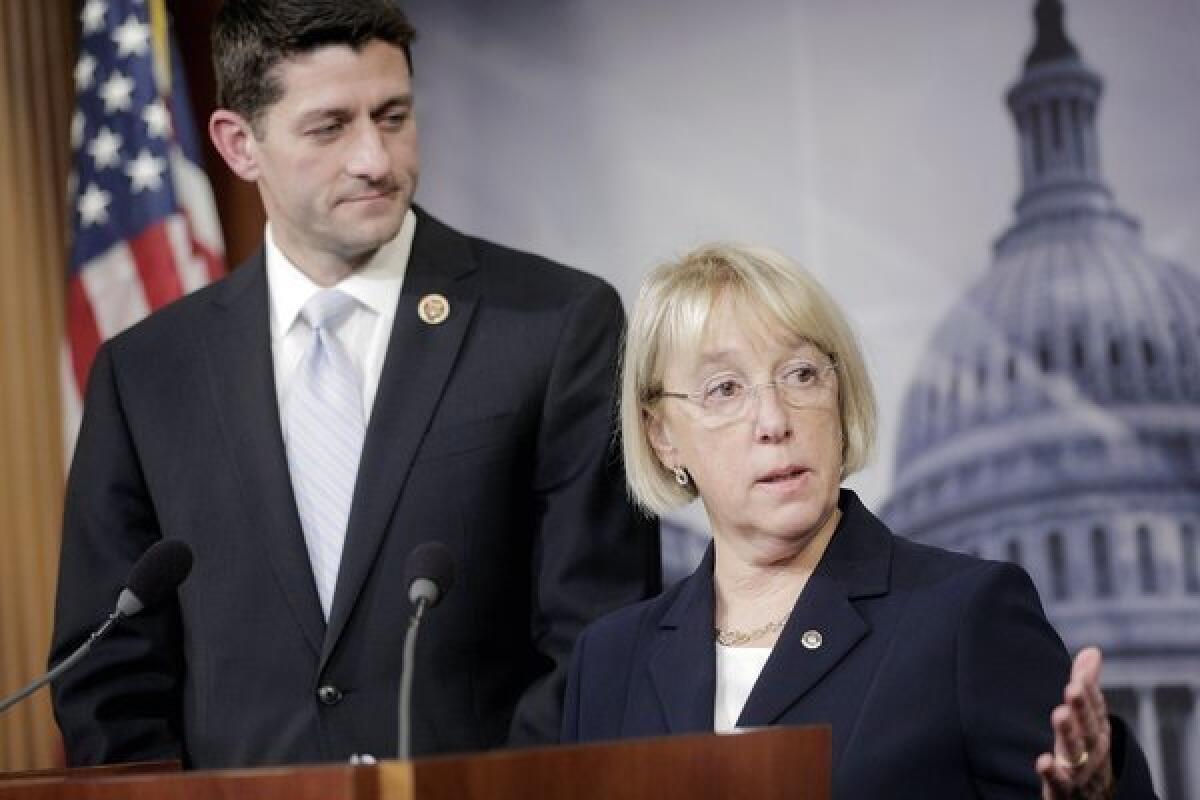Piling on the Murray-Ryan budget deal

Here’s what counts as success in Washington these days: a budget deal that almost everyone hates and that doesn’t solve any of the country’s major problems.
The spending bill that Sen. Patty Murray (D-Wash.) and Rep. Paul D. Ryan (R-Wis.) unveiled Tuesday evening has something for everyone to dislike. It won’t cut federal spending or shrink the national debt, so conservative Republicans don’t like it. It won’t restore much money for domestic programs or extend unemployment insurance, so Democrats don’t like it either.
Its main virtue is that it will spare members of Congress from worrying about a government shutdown during their long Christmas break.
YEAR IN REVIEW: Washington’s 5 biggest ‘fails’ of 2013
But in these dark days, the prospect of a deal — any deal — is hailed as the dawn of a new age of pragmatism and bipartisan cooperation.
After a series of fiscal train wrecks culminating in the 16-day government shutdown this fall (a shutdown that accomplished exactly nothing), the idea of a staunch conservative and an equally staunch liberal forging a bipartisan, bicameral compromise seems almost charming.
Let’s be clear, though. The deal isn’t a grand bargain — at best it’s a mini-bargain. All the Murray-Ryan deal would do, in essence, is split the difference between House and Senate spending proposals, give federal agencies a little more flexibility to adjust to the budget cuts imposed by the sequester, and — the main thing — avoid the prospect of another government shutdown on Jan. 15.
YEAR IN REVIEW: Highs and lows from Obama’s roller-coaster year
It won’t reduce the national debt, something both parties say they want. It won’t reform the tax code. It won’t even end the sequester’s meat-cleaver method of indiscriminate, across-the-board cuts.
Surely the Congress of the United States, legislature of the world’s greatest democracy, can do better than this?
Actually, maybe not. By Tuesday afternoon, even before Murray and Ryan had a chance to unveil their handiwork, the well-funded pressure groups of the tea party right were swinging into action, warning Republicans in the House of Representatives that if they voted for Paul Ryan’s deal — Paul Ryan’s! — they’d be branded as big spenders.
“Congressional Republicans are joining liberal Democrats in breaking their word to the American people to finally begin reining in government overspending,” thundered Americans for Prosperity, a conservative group funded partly by billionaire brothers Charles and David Koch. “Politicians choosing to go back on their promise will be held accountable for their actions.”
As those unsubtle threats rattled across the right side of the Internet, at least 30 conservative members of the House signed a letter rejecting the deal. And yes, the signers included many of the same tea party members who strong-armed House Speaker John A. Boehner into forcing the government shutdown last fall, a gambit that drove the Republican Party’s standing to a record low and briefly made President Obama popular again.
Shall we try another shutdown?
It’s easy to see why tea party members of Congress don’t like the deal. It increases federal spending by almost 5% above the level set by the sequester law next year. It starts to dismantle the sequester, a budget tool conservatives have decided they want to keep even though they originally opposed it. And it increases federal revenue by raising “security fees” on airline passengers — not technically a tax, but awfully close.
Democrats don’t like the deal much either. It won’t add any serious money for their favorite projects such as infrastructure spending. It doesn’t close any of the tax loopholes they’ve been trying to close. And it doesn’t include an extension of federal emergency benefits for the long-term unemployed, meaning 1.3 million jobless people will take a hit just after Christmas.
So why are Senate Majority Leader Harry Reid and Boehner, who can’t agree on much else, bent on muscling it through? Because they want to fight about other things instead.
Boehner and his Republicans want to spend 2014 talking about the failings of Obamacare, campaigning for a GOP takeover in the Senate and, above all, avoiding a repeat of last year’s shutdown debacle.
Reid and his Democrats want to focus on Obama’s populist economic agenda, including a proposal to increase the minimum wage and other measures to attack inequality. And they want to focus on defending their vulnerable seats against the GOP. A government shutdown would hurt Republicans, but it wouldn’t do Democratic incumbents much good either.
“The key thing is to keep the train on the track,” GOP pollster David Winston told me. “The Murray-Ryan deal doesn’t solve any big problems, but it allows everything else to move forward.”
Does that qualify as success? These days, it might. But even then, it still has to get past the tea party.
Twitter: @DoyleMcManus
More to Read
A cure for the common opinion
Get thought-provoking perspectives with our weekly newsletter.
You may occasionally receive promotional content from the Los Angeles Times.







